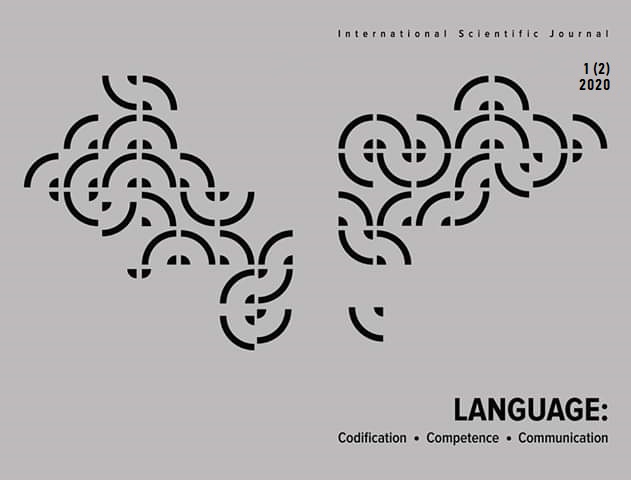UNIVERBATION AS AN INTERLINGUAL PHENOMENON
DOI:
https://doi.org/10.24025/2707-0573.1(2).2020.201786Abstract
Abstract. The article deals with definition of univerbation, which is universal phenomenon for different languages. Modern linguistics considers univerbation as the active way to form new words basing upon word combinations. But declaration of laws of univerbation does not involve such a semantic identity as word combination-univerb, motivation type, and other important features characterizing the phenomenon. Hypothesis of the study is in the fact that a word of any part of speech is only one of the speech modifications of an abstract (linguistic) nominative unit (being structural in its nature) which is called a nominatheme. On the one hand, it can be actualized in speech not only in the form of a word but also in polyverbal units; on the other hand, it can have any monoverbal nominative formation as the dominant of its language modification. Basing upon that fact, it can be assumed that univerbs are capable of representing two nominative types in language and speech area respectively. Object under analysis is univerbalizing processes in the context of their diversity. “Word combination – word” parallels of the type under analysis are forms of abstract lexical unit called nominatheme characterizing by a number of formal peculiarities and semantic ones typical for the lexical structures only. Nominative approach to the description of univerbs allows singling out polyverbal and verbal doublets of a basic linguistic unit. Verbal implementations of “verb combination + elliptical univerb” type nominathemes are subject to univerbalization, nominalization, and lexicalization forming three types depending on the complex of processes of their fixation in a language as well as on their linguistic functioning. The proposed consideration of univerbation is the specific example of the analysis performed on the basis of complex approach to the study of verbal and linguistic nominative units. In future it will be possible to model the nominative units in different languages.
Key-words: derivation, motivation, nominatheme, nomination, word, word combination, univerb, univerbalization.
References
Alpatov, V. 1982. “On two approaches to single out basic linguistic units”. Problems of linguistics. 6: 66 – 74.
Diachok, N. 2015. Univerbation in the Russian language: structural and semantic and onomasiological description. Dissertation for the Degree of Doctor of Philology, speciality 10.02.02 – Russian language. O. O. Potebnia Institute of Linguistics of the Ukrainian National Academy of Sciences. Kyiv. 522 p.
Diachok, N. 2018. “Universalization as a universal lingual phenomenon. Theoretical and applied problems of modern philology”. Collection of scientific works. 6: 143–149.
Isachenko, А. 1958. “On the issue of structural typology of the vocabularies of the Slavonic literary languages”. Slavia. 27. 3: 334 – 352.
Ishchenko, I. 2003. “Peculiarities of semantics and grammar of a derivative word” [E-resource]. Messenger of Amur University. 3. access mode: http://www.amursu.ru/vestnik/3/.
Moiseienko, V. 2003. “Once more on history of word водка (etymological description)”. Slavonic Messenger. 1: 84 – 95.
Osipova, L. 2004. “Suffix univerbation as a productive way to form new words in Russian colloquial speech” [E-resource]. The Russian language: historical background and the present: 2nd International congress of the Russian language researchers, Access mode: http://www.philol.msu.ru/~rlc2004/ru/participants/psearch.php?pid=12514.
Snitko, Е. 1982. “Derivation and its types in the Russian language”. Russian linguistics. 4: 84 – 89.
Sreznevskii, I. 1989. Dictionary of Old Russian language. М.
Terkulov, V. 2006. “Once more on the basic linguistic unit”. Messenger of Lugansk National Pedagogical University named after Taras Shevchenko: “Philological sciences”: collection of scientific papers. Lugansk: Alma-mater. 11 (106): 127 – 137.
Terkulov, V. 2008. Composites of the Russian language in the onomaseological context: thesis … Doctor of Philological Sciences: 10.02.02. Gorlovka. 404 pp.
Published
Issue
Section
License
Copyright (c) 2020 Natalia Diachok, Олександр Івко

This work is licensed under a Creative Commons Attribution-NonCommercial 4.0 International License.
Authors hold full copyright and at the same time they transfer the publishing rights to the journal. The author of a published article has the right to distribute it, post the work in the electronic repository of his/her institution, publish as a part of a monograph, etc. with a required link to the place (output) of its first publication.
The authors confirm that the scientific article submitted for publication has not previously been published and has not been submitted to the editorial office of other journals.
If you have any questions, please contact us:
email: ukrmova@chdtu.edu.ua, o.pchelintseva@chdtu.edu.ua
Viber / WhatsApp: +38 093 789 09 27


